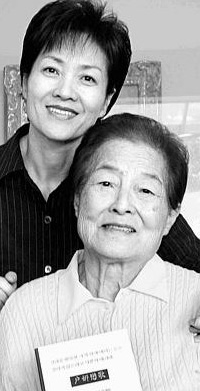
Poet Son Hoyun and her eldest daughter, Poet Lee Sunshine
The book of poetry translated into Korean by Poet Lee
The life and oeuvre of the only tanka poet in Korea, Son Hoyun, is currently being reevaluated, ever since it was reported that her works and spirit of peace was mentioned at the Korea-Japan Summit Meeting on June 20th and it softened the formal atmosphere.
Japanese Prime Minister, Koizumi, accompanied by President Roh Moohyun, at his meeting with the international press right after the summit talks, quoted two lines of Son’s poem, “I have a desperate hope ‘May these countries be without strife,’” and said, “this is not the mind of Poet Son only. Keeping such a spirit of Poet Son Hoyun in my mind, I will make a greater effort to improve the relationship of the two countries.”
It was the hidden effort of Son’s eldest daughter, poet Lee Sunshine, that made Son’s poem an issue during the summit talks and had Prime Minister Koizumi reciprocate in such a way.
The chief director of ‘Son Hoyun Memorial Association’, Lee sent the collection of works of Son Hoyun and a sixty-minute-long documentary film on her life to the Japanese parties before the Summit Talks. She informed the Korean parties on the poet Son’s influence in Japan and repeatedly emphasized the importance of “cultural diplomacy”.
Having observed the Prime Minister Koizumi’s press conference, Lee said, “I feel thankful that the sprit of peace and love sung by her mother through her single-line tankas finally pervaded in the Korea-Japan relationship.
The poet Son composed more than two thousand single-line tankas for 53 years. Many of her works are about her longing for the peace between Korea and Japan and of humankind. “Tanka” is a short poem made of thirty-one letters in a five-unit pattern of five-seven-five-seven-seven. It is treated as national poetry of Japan but its origin traces back to hyangga, the native folks songs of Baekje.
Accepting criticism questioning why a Korean composes Japanese poems, the reason why Son did not give up on Tanka is that she had a belief that she was keeping the “spirit of Baekje” as the only tanka poet in Korea.
Her Tanka fully embodies the traditional sentiment of Korea, for example, as in “Beautifully dressed up in Chima-jeogori, I smell the ancient fragrance of Baekje.” In 1941, during her study abroad in Japan, the poet studied under the great Tanka poet, Sasaki Nobutsuna.
Except during the period of her study in Tokyo, Son devoted her life to compose Tanka, living in an old house in Pilun-dong, Seoul. She is more well known in Japan than in Korea. Including a six-volume series of Mugunwha published at Kōdansha, one of the leading publishing companies in Japan, the poet left six books of poetry, which amount to more than two thousand poems.
In Korea, On the tip of thorns of wild rose snow sits down gently not to get pricked — Poems of Love by Hoyun (planned and translated by Lee Sunshine) was published in 2002 by Samtoh.
Jo Jong-do reporter